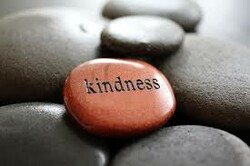Embracing the Power of Kindness: February's Heartfelt Journey

Hello, wonderful parents and students!
As we step into February, a month associated with love and warmth, we're excited to explore the heartwarming theme of Kindness. This month, let's join hands to spread positivity and create ripples of compassion that touch hearts both big and small. Join us on a journey of making the world a brighter place through acts of kindness and genuine connection.
Resource Roundup: Nurturing Kindness
Explore these carefully selected resources for parents and students of all ages, designed to inspire and cultivate kindness:
- 31 Kindness Activities for Kids - Discover ways to initiate and experience acts of kindness firsthand.
- 11 Fun Kindness Activities for Kids for Random Acts of Kindness Day
For more resources, check out the Kindness page on the NLPS website.
The Cold Lake Enviroroyals created a program for students called, the Community Pantry. Partnering with the Student Supports Office they have created a space in the Student Supports Office for students to leave a snack, take a snack. Open to all students of Cold Lake High School. This program allows for students that may need a little extra nourishment through out the day, at no cost to the student. This program has be hugely successful, students have been donating and receiving items daily.
Reflecting on Last Month: Your Insights Matter!
In January, we embraced a healthy lifestyle. Share your experiences: How did our previous mental health blog post impact your family? Your feedback and ideas are treasured.
Nurturing Kindness: Tips for Students
Students, let's cultivate kindness:
- Offer a smile or kind words to brighten someone's day.
- Help a classmate or teacher with schoolwork or a task.
- Create and share uplifting notes or artwork.
- Practice active listening and show empathy.
- Stand up against bullying and offer support.
How to Be Kind to Yourself (Hogan, 2024)
Life can be challenging, with many variables outside of our control. It is not easy to manage the flurry of emotions that arise during difficult times. However, there are things that we can actually do that will help us be kinder to ourselves, especially when we start to feel out of control or in despair. When we are more forgiving to ourselves, these difficult emotions have less of an effect on our overall emotional well-being.
Being kind to yourself has four hallmarks:
- Speaking to yourself in a kind tone
- Understanding that pain is a universal experience
- Looking at your emotions clearly and soberly in a way that neither suppresses nor exaggerates them
- Setting realistic expectations for yourself in any given situation
If you have the habit of being self-critical or pessimistic, it can be difficult to imagine what showing yourself kindness even looks like. Practicing may feel unnatural, awkward, and fake. But remembering what it feels like to be kind to others can make the whole process of being kind to yourself easier.
Tips for Being Kinder to Yourself
These are practices you can incorporate into your everyday life:
- Show up for your difficult feelings. Sitting alone with your thoughts is difficult and can feel unnatural. This is why practicing is vital to being kinder to yourself, especially when life gets tough. Difficult emotions have much to teach us, particularly when we stop labeling them as difficult. Notice when and how you are avoiding your own challenging feelings and try to stop doing so. This will allow you to be more kind to yourself.
- Do things you like. Even if you are the most belittling self-talker in the world, there are still actions you can take to be nicer to yourself. Notice how you already take care of yourself and what that looks like for you. Know that you don’t need to start meditating or model your self-kindness on how others are kind to themselves. Maybe your idea of self-kindness is to listen to music, dance, read, call a loved one, or play board games with your family. Perhaps it is something altogether different. Whatever it is, notice that doing it brings you joy and make an effort to both do it more often and find additional activities you also enjoy doing.
- Center on what you value. Many of our ways of doing things have changed since the COVID-19 pandemic. Some people lost their jobs or began working remotely. Other people have lost friends and family. But, these challenges and tragedies can demonstrate how we can do a better job showing up in our lives and embodying our values. For example, if supporting your family financially is important to you but you have lost your job, try supporting them in other ways, including emotionally or spiritually. There is always a way to adapt and embody our best selves, even in the midst of tragedy. It is also a true act of self-kindness and self-care.
- Ground yourself. When you begin to feel unsettled or scared, pay special attention to your feet. Notice how they are planted to the ground and that the floor supports you. Bring your attention back to the current moment and try to anchor yourself to the present. Taking your mind off your thoughts might help you feel more clearheaded and settled.
- Savor your physical senses. Much of modern life is focused on reading, thinking, working, and making sense of the world around us. Luckily, joy can be found anywhere, even in the simple moments of savoring smells, tastes, or beautiful views. Enjoying a delicious meal or noticing the smell of your favorite perfume can bring you much joy. Despite what else may be going on in your life, never forget to give yourself the gift of enjoying the little things — this can change how you see yourself and the world around you.
- Hug yourself. Physical affection and care are grounding, affirming, and loving. Even if you are alone, you can still feel these things by hugging yourself or patting your own arm. These physical gestures are proven to reduce naturally occurring stress or cortisol levels.
- Notice what you are grateful for. Actively taking time to be grateful brings more joy to your life and can help take your mind off of your negative thoughts. Gratitude can happen even in the smallest of moments — a hot cup of coffee, a particularly bright morning, or even just the thought that you are alive one more day.
(WebMD, 2024, https://www.webmd.com/balance/features/how-to-be-kind-to-yourself)
Connect with Our Student Advocacy Counsellors: Reach Out for Support
Need guidance or wish to discuss well-being? Our Student Advocacy Counsellors are here for you. Reach out to:
Erin MacDonald (A-K) erin.macdonald@nlsd.ab.ca
Kimberly Turchyn (L-M) kimberly.turchyn@nlsd.ab.ca
Reach out by email or call 780-639-0039.
Let's continue our journey of kindness and positivity together.
Here's to a February filled with heartfelt gestures, shared smiles, and a tapestry of kindness. Let's make the world brighter, one act of kindness at a time!
